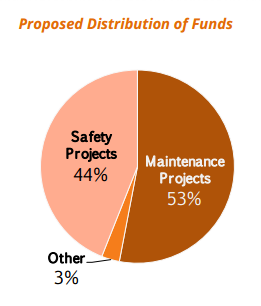With Portland’s mayor and transportation commissioner sticking adamantly to their guns on the notion that the city needs more money for its street system, other political chess pieces are moving.
Here’s one of the biggest: should less of the money go toward street safety and more toward street maintenance?
The initial plan from city leaders, which the city council sent back for retooling in June, was for 44 percent of the $50 million a year fee to go toward “safety projects” such as 4 miles a year of new neighborhood greenways, 70 city blocks a year of new sidewalks, 20 safer street crossings per year and a mile or two of new protected bike lanes each year.
Another 53 percent would go to repaving 30 to 50 miles of city streets each year, plus other maintenance like replacing 8,000 faded city street name signs each year.
The remaining 3 percent would go toward better public transit (a frequent-service bus line along 122nd Avenue is often mentioned), paving dirt and gravel streets and strengthening bridges against earthquakes.
But that came out to only about $20 million per year to maintain road pavement, about one-quarter of what the city’s pavement forecast says is needed to keep the streets from continuing to fall apart. With that in mind (among other things, presumably) some business advocates have been urging the city to allocate less to what the city refers to as “safety” and more to what it refers to as “maintenance.”
Advertisement
Here are a couple of the city’s own tweets from a meeting Monday with the new work group that’s representing business owners as the city tweaks its proposal:
Some in working group question split b/w maintenance & safety. Suggest reducing money raised & dedicate to maintenance. #OurStreetsPDX
— PDX Transportation (@PBOTinfo) July 14, 2014
Working group will take look at alternative fee configurations during next meeting, which is set for July 28. #OurStreetsPDX
— PDX Transportation (@PBOTinfo) July 14, 2014
In other street fee news, Willamette Week, the Mercury and The Oregonian have all published useful explainers in the last few weeks that look at the city’s transportation budget from various angles. I’ll summarize the main idea of each piece:
- WW: The city has known about its maintenance problem for years, but it’s dedicated discretionary spending toward other projects rather than chipping away at the vast maintenance backlog.
- Merc: The city’s transportation office gets almost no property tax money directly.
- O: It’d be essentially impossible to eliminate Portland’s paving backlog within the city’s current $110 million discretionary budget, and very hard to find $20 million even if you completely eliminated every nonessential program.
Finally, I’ll add an updated version of a chart we published in May, which compares the $12-a-month street fee to some other relevant payments to government:
The city has also convened a “non-profit and low-income stakeholder” work group to fine-tune the street fee concept in advance of a possible City Council vote in November. Its meetings are one day after the business work group’s, starting July 29.



